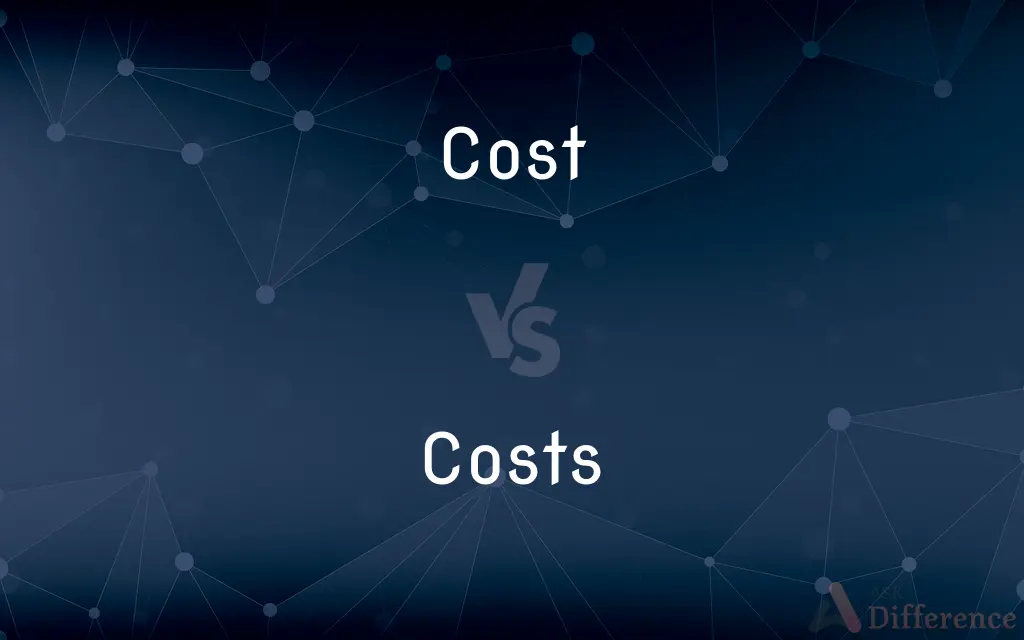Cost vs. Costs — What's the Difference?
Edited by Tayyaba Rehman — By Maham Liaqat — Updated on March 12, 2024
"Cost" refers to the amount required to purchase or produce something, often seen as a singular entity, while "costs" implies multiple expenses or aspects of expenditure in various contexts.

Difference Between Cost and Costs
Table of Contents
ADVERTISEMENT
Key Differences
Cost represents the singular form of the term, typically referring to the overall amount required to acquire, produce, or maintain something. For instance, the cost of a new car encompasses its purchase price, taxes, and registration fees. On the other hand, costs denote the plural form, highlighting multiple expenses involved in a process or for various items. It emphasizes the diverse types of expenditures a company faces, such as production, labor, and shipping costs.
When discussing financial planning or budgeting, "cost" might be used to refer to a specific major expense, like the cost of purchasing a piece of equipment. Whereas, "costs" would be discussed in the context of detailed budgeting, breaking down all the individual expenses that need to be considered, from utilities to employee salaries.
In accounting, "cost" can refer to the expense associated with a particular item or service, crucial for pricing and profit calculation. In contrast, "costs" might refer to the various categories of expenses a business incurs, such as fixed costs, variable costs, and operational costs, each contributing to the total expenditure.
The term "cost" is often used in decision-making scenarios, where the focus is on the price of a single investment or action. Conversely, "costs" might be used when evaluating the overall financial impact of a project, including all associated expenses, to assess its feasibility or profitability.
While "cost" can be abstract and refer to non-monetary implications, such as the environmental cost of manufacturing, "costs" highlights the multiplicity of these implications, including both direct and indirect expenses, thus providing a more comprehensive view of the total impact.
ADVERTISEMENT
Comparison Chart
Definition
The amount required to purchase, produce, or maintain something.
Multiple expenses or aspects of expenditure.
Usage
Refers to a single expense or the overall expenditure on one item.
Refers to various individual expenses within a context.
Context
Often used in singular investment or purchase scenarios.
Used in detailed financial analysis and budgeting.
Accounting Focus
The expense associated with a particular item or service.
Various categories of expenses incurred by a business.
Decision Making
Used when focusing on the price of a single investment.
Used when evaluating the overall financial impact of a project.
Compare with Definitions
Cost
The price paid to acquire, produce, or maintain something.
The cost of the software license was $200.
Costs
The total of separate amounts spent on multiple items or services.
The costs of the trip included flights, hotels, and meals.
Cost
An amount that must be spent or sacrificed to obtain something.
The cost of his ambition was less time with his family.
Costs
Expenses awarded against a litigant.
The defendant was ordered to pay the costs of the lawsuit.
Cost
A disadvantage or unpleasant consequence.
The environmental cost of rapid industrialization is alarming.
Costs
The plural form referring to different types of expenses.
Direct and indirect costs are critical in price setting.
Cost
The effort, loss, or sacrifice necessary to achieve or obtain something.
The cost of success can often be high.
Costs
Various expenditures that a business incurs.
The company's monthly costs include rent, utilities, and payroll.
Cost
The total money, time, and resources associated with a production or activity.
The cost of manufacturing includes materials and labor.
Costs
Charges or fees associated with something.
The project's costs exceeded its budget.
Cost
In production, research, retail, and accounting, a cost is the value of money that has been used up to produce something or deliver a service, and hence is not available for use anymore. In business, the cost may be one of acquisition, in which case the amount of money expended to acquire it is counted as cost.
Costs
To require a specified payment, expenditure, effort, or loss
It costs more to live in the city.
Cost
An amount paid or required in payment for a purchase; a price.
Costs
An amount paid or required in payment for a purchase; a price.
Cost
The expenditure of something, such as time or labor, necessary for the attainment of a goal
"Freedom to advocate unpopular causes does not require that such advocacy be without cost" (Milton Friedman).
Costs
The expenditure of something, such as time or labor, necessary for the attainment of a goal
"Freedom to advocate unpopular causes does not require that such advocacy be without cost" (Milton Friedman).
Cost
Costs(Law) Charges incurred in bringing litigation, including court fees and charges that may be payable by the losing party, but usually not including attorneys' fees.
Costs
Costs(Law) Charges incurred in bringing litigation, including court fees and charges that may be payable by the losing party, but usually not including attorneys' fees.
Cost
To require a specified payment, expenditure, effort, or loss
It costs more to live in the city.
Costs
To have as a price.
Cost
To have as a price.
Costs
To cause to lose, suffer, or sacrifice
Participating in the strike cost me my job.
Cost
To cause to lose, suffer, or sacrifice
Participating in the strike cost me my job.
Costs
Past tense and past participle costed To estimate or determine the cost of
The accountants costed out our expenses.
Cost
Past tense and past participle costed To estimate or determine the cost of
The accountants costed out our expenses.
Costs
Plural of cost
Cost
To incur a charge of; to require payment of a (specified) price.
This shirt cost $50, while this was cheaper at only $30.
It will cost you a lot of money to take a trip around the world.
Costs
Pecuniary reimbursement to the winning party for the expenses of litigation
Cost
To cause something to be lost; to cause the expenditure or relinquishment of.
Trying to rescue the man from the burning building cost them their lives.
Cost
To require to be borne or suffered; to cause.
Cost
To calculate or estimate a price.
I'd cost the repair work at a few thousand.
Cost
Amount of money, time, etc. that is required or used.
The total cost of the new complex was an estimated $1.5 million.
We have to cut costs if we want to avoid bankruptcy.
The average cost of a new house is twice as much as it was 20 years ago.
Cost
A negative consequence or loss that occurs or is required to occur.
Spending all your time working may earn you a lot of money at the cost of your health.
The army won the battle decisively, but at a cost of many lives.
Cost
(obsolete) Manner; way; means; available course; contrivance.en
Cost
Quality; condition; property; value; worth; a wont or habit; disposition; nature; kind; characteristic.
Cost
(obsolete) A rib; a side.
Cost
(heraldry) A cottise.
Cost
A rib; a side; a region or coast.
Betwixt the costs of a ship.
Cost
See Cottise.
Cost
The amount paid, charged, or engaged to be paid, for anything bought or taken in barter; charge; expense; hence, whatever, as labor, self-denial, suffering, etc., is requisite to secure benefit.
One day shall crown the alliance on 't so please you,Here at my house, and at my proper cost.
At less cost of life than is often expended in a skirmish, [Charles V.] saved Europe from invasion.
Cost
Loss of any kind; detriment; pain; suffering.
I know thy trains,Though dearly to my cost, thy gins and toils.
Cost
Expenses incurred in litigation.
Cost
To require to be given, expended, or laid out therefor, as in barter, purchase, acquisition, etc.; to cause the cost, expenditure, relinquishment, or loss of; as, the ticket cost a dollar; the effort cost his life.
A diamond gone, cost me two thousand ducats.
Though it cost me ten nights' watchings.
Cost
To require to be borne or suffered; to cause.
To do him wanton rites, which cost them woe.
Cost
The total spent for goods or services including money and time and labor
Cost
The property of having material worth (often indicated by the amount of money something would bring if sold);
The fluctuating monetary value of gold and silver
He puts a high price on his services
He couldn't calculate the cost of the collection
Cost
Value measured by what must be given or done or undergone to obtain something;
The cost in human life was enormous
The price of success is hard work
What price glory?
Cost
Be priced at;
These shoes cost $100
Cost
Require to lose, suffer, or sacrifice;
This mistake cost him his job
Common Curiosities
What is the difference between cost and costs?
Cost refers to a single expense or the overall expenditure on something, while costs refer to multiple expenses or types of expenditure.
How do businesses use the concept of cost vs. costs?
Businesses use "cost" to refer to specific expenses or investments, and "costs" to discuss their overall expenditure, including all categories of expenses they need to manage.
Why is it important to differentiate between cost and costs?
Differentiating between the two helps in precise financial planning, budgeting, and analysis, ensuring a clear understanding of individual expenses versus the collective financial impact of multiple expenditures.
Does the concept of cost apply only to businesses?
No, the concept of cost applies to individuals, governments, and organizations, anyone who needs to consider expenditures and resources.
How do cost and costs relate to profitability?
Cost directly affects profitability by determining the expense side of profit calculations, while managing costs effectively is crucial for maximizing profitability.
Is depreciation considered a cost or among costs?
Depreciation is considered among costs, specifically a type of fixed cost over time for the use of assets.
Can "cost" refer to non-monetary values?
Yes, "cost" can also refer to non-monetary values, such as time, effort, or environmental impact.
Are costs always monetary?
While "costs" typically refer to monetary expenses, they can also include time and resources in broader contexts, especially in economics or project management.
Can "costs" include future expenditures?
Yes, "costs" can include both current and future expenditures, especially in planning and forecasting.
Can cost and costs affect decision-making?
Yes, both cost and costs are crucial in decision-making, influencing choices by assessing financial implications and resource allocation.
Share Your Discovery

Previous Comparison
Beauceron vs. Rottweiler
Next Comparison
Dawn vs. DaybreakAuthor Spotlight
Written by
Maham LiaqatEdited by
Tayyaba RehmanTayyaba Rehman is a distinguished writer, currently serving as a primary contributor to askdifference.com. As a researcher in semantics and etymology, Tayyaba's passion for the complexity of languages and their distinctions has found a perfect home on the platform. Tayyaba delves into the intricacies of language, distinguishing between commonly confused words and phrases, thereby providing clarity for readers worldwide.
















































